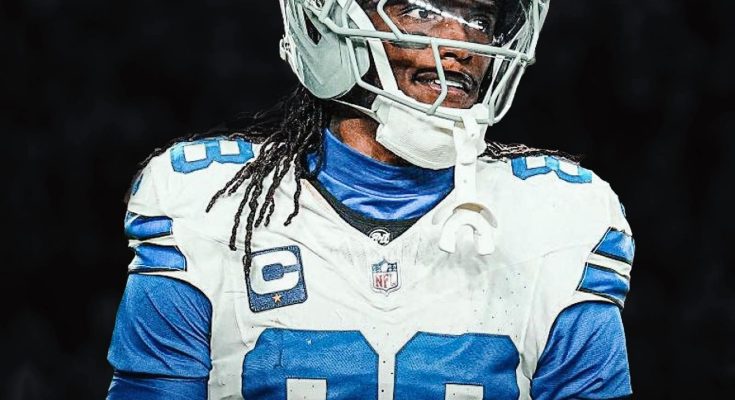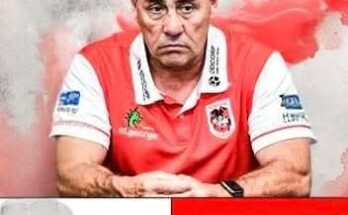CeeDee Lamb arrived at the Cowboys’ facility on an off‑day—a day when players had no obligation to show up. Instead, he made a choice that spoke volumes: he put in work, standing outside with the Jugs machine, firing catch after catch in a solitary effort to shake off a rough performance. It was a quiet demonstration of discipline and focus, one confirmed by team journalist Nick Harris, who noted that this spontaneous session followed a career‑high four drops in Thursday night’s loss to the Eagles. Lamb’s actions felt like more than just practice. They were a message.
Lamb had every right to be frustrated. His season‑opening night ended in a painful 24‑20 loss, and though he managed seven catches for a game‑high 110 yards, those drops haunted him—especially three critical ones that came at the worst possible times. With the game on the line, passes slipped through his grasp; one deep throw from Dak Prescott, perfectly placed, bounced out and left Lamb visibly stunned—an image that would replay in his mind.
In the locker room after the game, Lamb didn’t mince words. “Man, that’s terrible,” he said. “Honestly, I feel like I can’t point no finger at anybody else.” Dropped passes weren’t a burden he shifted onto the coach, the quarterback, or the conditions—not a glare from the sun, not the noise of the crowd, just him. “I take full accountability,” he declared. “As a player, I’ve prayed for moments like that, for the ball to come my way. For me not to come up with it, that stings a little bit.” He paused, a moment of raw professionalism: “I need to catch the damn ball.”
It wasn’t lost on anyone that this wasn’t just a rough day—it was a moment with broader implications. The Cowboys had just committed significant resources to Lamb, handing him a four‑year, $136 million deal last summer. The expectations were clear. He was supposed to be a cornerstone of the offense
Prescott, always measured, offered steady support. “There wasn’t a big, long talk we needed to have,” he said. “He took ownership… It wasn’t just those plays. There are throws I want back. But it’s Game 1, and he’s a guy who’s gonna make those plays. We’re not gonna get down on him… He will make those plays.” That confidence, that steadfast faith, was not lost on Lamb.
Coach Brian Schottenheimer echoed the sentiment. “Don’t worry about CeeDee Lamb,” he assured. “CeeDee’s going to be fine. What a great player. This was a team defeat, and we own that.” It wasn’t an excuse—nothing short of reassuring that in a moment of adversity, the team’s stance was protection, not interrogation
But there were no magical fixes. Social media buzzed with criticism, and analysts didn’t spare him. The Houston Chronicle pointed out the added sting of the drops—knowing how much the team invested in him. “They might have done it with any one of three catches Lamb should have made,” the AP‑sourced piece noted, emphasizing that crucial plays slipped away when he stood ready for them.
Still, in the face of criticism, Lamb didn’t budge. Instead, he opted for self‑correction. And that’s where the off‑day practice comes into sharp relief. There he was, on his own time, running repetition after repetition on the Jugs machine—a player making the kind of burning statement that says: I know what went wrong, and I intend to make sure it doesn’t happen again.
It’s not the first time Lamb has responded to adversity with action. He’s had moments of redemption before and has spotlighted hard work as a path forward. But this felt more personal. This wasn’t a redemptive game the next week—this was a silent, intentional reset, one we might not see re‑aired in highlight reels but emblematic of the resilience he brings.
In interviews post‑game, he led with accountability: “I need to catch the damn ball.” No excuses. No blame. Just responsibility. And the subtext couldn’t be clearer: I’m going to work until that doesn’t happen again. That’s leadership.
Meanwhile, Prescott’s confidence in him and the coach’s reassurance anchored the response in trust, not frustration. The narrative shifted subtly—this wasn’t a fall from grace but a bump on the road. The team-owned the loss, positioned Lamb for a bounce-back, and seemed to believe in his comeback almost as much as he did himself
So when Lamb returned to the facility on that off‑day, with no requirement to be there, and faced the Jugs machine with determination rather than self‑pity, it felt like a turning point. It was accountability personified. That solitary drill, those repeated catches and drops, spoke more than post‑game quotes ever could.
It’s only one game—Game 1 of 17. But with that simple off‑day effort, Lamb might have made his clearest statement yet: adversity doesn’t define you. Your response does.



